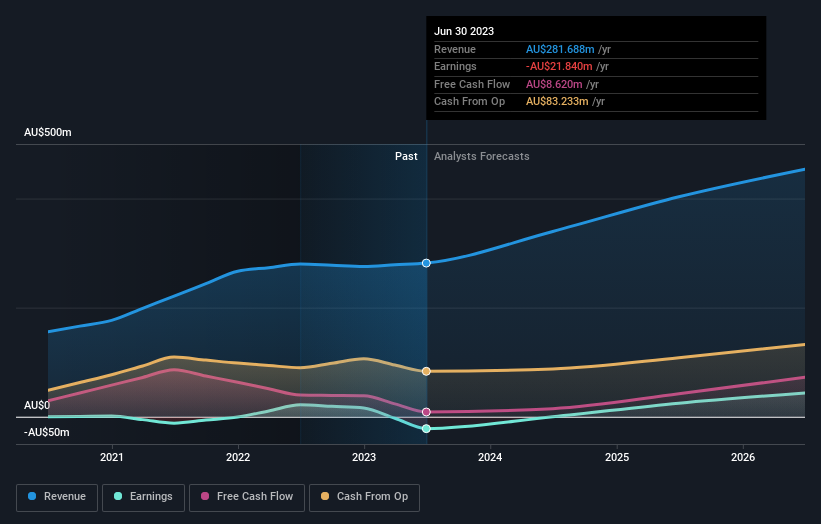- Australia
- /
- Real Estate
- /
- ASX:PXA
Painful week for individual investors invested in PEXA Group Limited (ASX:PXA) after 4.9% drop, institutions also suffered losses

Key Insights
- PEXA Group's significant individual investors ownership suggests that the key decisions are influenced by shareholders from the larger public
- 50% of the business is held by the top 14 shareholders
- Insiders have been buying lately
A look at the shareholders of PEXA Group Limited (ASX:PXA) can tell us which group is most powerful. The group holding the most number of shares in the company, around 45% to be precise, is individual investors. In other words, the group stands to gain the most (or lose the most) from their investment into the company.
While institutions who own 30% came under pressure after market cap dropped to AU$2.0b last week,individual investors took the most losses.
Let's delve deeper into each type of owner of PEXA Group, beginning with the chart below.
View our latest analysis for PEXA Group

What Does The Institutional Ownership Tell Us About PEXA Group?
Institutions typically measure themselves against a benchmark when reporting to their own investors, so they often become more enthusiastic about a stock once it's included in a major index. We would expect most companies to have some institutions on the register, especially if they are growing.
PEXA Group already has institutions on the share registry. Indeed, they own a respectable stake in the company. This implies the analysts working for those institutions have looked at the stock and they like it. But just like anyone else, they could be wrong. When multiple institutions own a stock, there's always a risk that they are in a 'crowded trade'. When such a trade goes wrong, multiple parties may compete to sell stock fast. This risk is higher in a company without a history of growth. You can see PEXA Group's historic earnings and revenue below, but keep in mind there's always more to the story.

Hedge funds don't have many shares in PEXA Group. Our data shows that Commonwealth Bank of Australia is the largest shareholder with 24% of shares outstanding. Challenger Limited is the second largest shareholder owning 5.0% of common stock, and First Sentier Investors (Australia) IM Ltd holds about 4.6% of the company stock. Additionally, the company's CEO Glenn King directly holds 0.6% of the total shares outstanding.
After doing some more digging, we found that the top 14 have the combined ownership of 50% in the company, suggesting that no single shareholder has significant control over the company.
Researching institutional ownership is a good way to gauge and filter a stock's expected performance. The same can be achieved by studying analyst sentiments. There are a reasonable number of analysts covering the stock, so it might be useful to find out their aggregate view on the future.
Insider Ownership Of PEXA Group
While the precise definition of an insider can be subjective, almost everyone considers board members to be insiders. Company management run the business, but the CEO will answer to the board, even if he or she is a member of it.
Insider ownership is positive when it signals leadership are thinking like the true owners of the company. However, high insider ownership can also give immense power to a small group within the company. This can be negative in some circumstances.
We can see that insiders own shares in PEXA Group Limited. It is a pretty big company, so it is generally a positive to see some potentially meaningful alignment. In this case, they own around AU$27m worth of shares (at current prices). Most would say this shows alignment of interests between shareholders and the board. Still, it might be worth checking if those insiders have been selling.
General Public Ownership
With a 45% ownership, the general public, mostly comprising of individual investors, have some degree of sway over PEXA Group. While this size of ownership may not be enough to sway a policy decision in their favour, they can still make a collective impact on company policies.
Public Company Ownership
Public companies currently own 24% of PEXA Group stock. It's hard to say for sure but this suggests they have entwined business interests. This might be a strategic stake, so it's worth watching this space for changes in ownership.
Next Steps:
While it is well worth considering the different groups that own a company, there are other factors that are even more important.
I always like to check for a history of revenue growth. You can too, by accessing this free chart of historic revenue and earnings in this detailed graph.
If you are like me, you may want to think about whether this company will grow or shrink. Luckily, you can check this free report showing analyst forecasts for its future.
NB: Figures in this article are calculated using data from the last twelve months, which refer to the 12-month period ending on the last date of the month the financial statement is dated. This may not be consistent with full year annual report figures.
New: Manage All Your Stock Portfolios in One Place
We've created the ultimate portfolio companion for stock investors, and it's free.
• Connect an unlimited number of Portfolios and see your total in one currency
• Be alerted to new Warning Signs or Risks via email or mobile
• Track the Fair Value of your stocks
Have feedback on this article? Concerned about the content? Get in touch with us directly. Alternatively, email editorial-team (at) simplywallst.com.
This article by Simply Wall St is general in nature. We provide commentary based on historical data and analyst forecasts only using an unbiased methodology and our articles are not intended to be financial advice. It does not constitute a recommendation to buy or sell any stock, and does not take account of your objectives, or your financial situation. We aim to bring you long-term focused analysis driven by fundamental data. Note that our analysis may not factor in the latest price-sensitive company announcements or qualitative material. Simply Wall St has no position in any stocks mentioned.
About ASX:PXA
PEXA Group
Operates a digital property settlements platform in Australia.
Reasonable growth potential with adequate balance sheet.
Market Insights
Community Narratives





